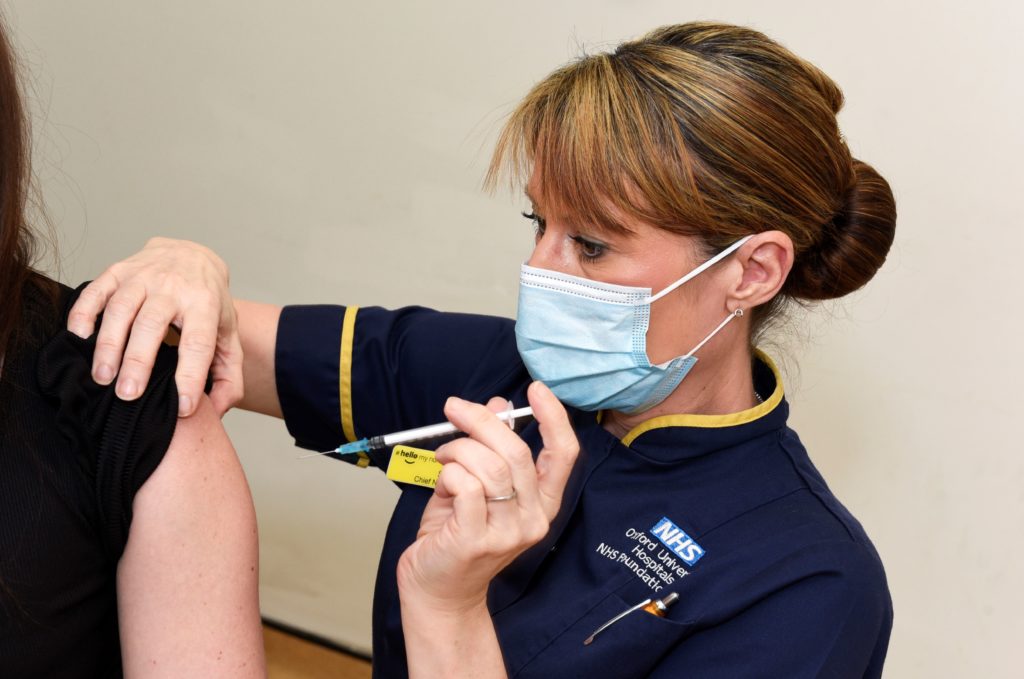Data from the national COVID-19 Infection Survey, which is led by senior NIHR Oxford BRC researcher Professor Sarah Walker, has revealed the impact of vaccination on antibody responses and new infections in a large group of adults from the general population.

This major community surveillance survey, one of the NIHR’s COVID-19 urgent public health studies, is a partnership between the University of Oxford, the Office of National Statistics (ONS) and the Department for Health and Social Care (DHSC).
Among the key findings were:
- COVID-19 infections fell significantly – by 65% percent – after a first dose of the Oxford-AstraZeneca or Pfizer-BioNTech vaccines.
- Two doses of the Pfizer-BioNTech vaccine offered similar levels of protection against COVID-19 as previous COVID-19 infection. Too few people have yet received two doses of Oxford-AstraZeneca to assess this.
- Vaccination was just as effective in individuals over 75 or with underlying health conditions, as it was in those under 75 or without health conditions.
- There was no evidence that the Oxford-AstraZeneca and Pfizer-BioNTech vaccines differed in their ability to reduce infection rates, despite them leading to slightly different immune response.
- Everyone showed at least some response to both vaccines. However, a small percentage of people (around 5%) had low responses to both vaccines – it will be essential to monitor their response to a second vaccination.
Two studies, released today as pre-prints, focused on the protection from infection provided by COVID-19 vaccines. Researchers analysed 1,610,562 test results from nose and throat swabs taken from 373,402 study participants between 1 December 2020 and 3 April 2021. Twenty-one days after a single dose of either Oxford-AstraZeneca or Pfizer-BioNTech vaccines (with no second dose), the rates of all new COVID-19 infections had dropped by 65%, symptomatic infections by 74% and infections without reported symptoms by 57%.
Reductions in infections and symptomatic infections were even greater after a second dose (70% and 90% respectively), and were similar to effects in those who had previously been infected with COVID-19 naturally. Vaccines were effective against variants compatible with the Kent strain (B.1.1.7). Benefits from vaccines in reducing new infections were similar in older individuals over 75 years and under 75 years, and in those reporting long-term health conditions and not reporting them.
Dr Koen Pouwels, senior researcher in Oxford University’s Nuffield Department of Population Health, says: “The protection from new infections gained from a single dose supports the decision to extend the time between first and second doses to 12 weeks to maximise initial vaccination coverage and reduce hospitalisations and deaths.
“However, the fact that we saw smaller reductions in asymptomatic infections than infections with symptoms highlights the potential for vaccinated individuals to get COVID-19 again, and for limited ongoing transmission from vaccinated individuals, even if this is at a lower rate. This emphasises the need for everyone to continue to follow guidelines to reduce transmission risk, for example through social distancing and masks.”
The second study compared how antibody levels changed after a single dose of either Oxford-AstraZeneca or Pfizer-BioNTech vaccines, or two doses of the Pfizer-BioNTech vaccine (generally given 21-42 days apart). In individuals who had not had COVID-19 before, antibody responses to a single dose of either vaccine were lower in older individuals, especially over 60 years. Antibody responses to two Pfizer-BioNTech doses were high across all ages, particularly increasing responses in older people to reach similar levels to those receiving a single dose after prior infection.
Antibody levels rose more slowly and to a lower level with a single dose of Oxford-AstraZeneca versus Pfizer-BioNTech, but then dropped more quickly with a single Pfizer-BioNTech dose to similar levels as a single dose of Oxford-AstraZeneca, particularly at older ages. However, although the size of the immune response differed, there was no group of individuals who didn’t respond at all to either vaccine.
David Eyre, Associate Professor at the University of Oxford’s Big Data Institute and an NIHR Oxford BRC Senior Fellow, says: “In older individuals, two vaccine doses are as effective as prior natural infection at generating antibodies to the SARS-CoV-2 virus that causes COVID-19. In younger individuals a single dose achieves the same level of response. Our findings highlight the importance of individuals getting the second vaccine dose for increased protection.”

Sarah Walker (left), Professor of Medical Statistics and Epidemiology at the University of Oxford and Chief Investigator and Academic Lead for the COVID-19 Infection Survey, says: “Without large community surveys such as ours, it is impossible to estimate the impact of vaccination on infections without symptoms – these have the potential to keep the epidemic going, particularly if people who have been vaccinated mistakenly think they cannot catch COVID-19. However, these studies show that vaccination and previous infection both protect against getting infected again.
“We don’t yet know exactly how much of an antibody response, and for how long, is needed to protect people against getting COVID-19 in the long-term – but over the next year, information from the survey should help us to answer these questions. We are very grateful to all our participants for giving up their time to help us,” says Prof Walker, the NIHR Oxford BRC’s Co-theme Lead for Antimicrobial Resistance and Modernising Microbiology.
Health Secretary Matt Hancocksays: “Vaccines work and today’s findings from the ONS and Oxford University provide further evidence that both the Pfizer and AstraZeneca vaccines are having a significant impact on reducing infections across the UK.
“With over 33 million first jabs already in arms, saving lives and cutting the risk of infection, it’s vital everyone gets their second dose when invited, to protect you and your loved ones against this disease.”
Health Minister Lord Bethellsays: ‘Studies like the ONS COVID-19 Infection Survey are critical to helping us build a picture of COVID-19 infections across the UK and I thank all those who took part and conducted this vital research.
“These real-world findings are extremely promising and show our historic vaccination programme is having a significant impact across the UK by reducing infections among people of all ages, including those with underlying health conditions.”
The COVID-19 Infection Survey is the largest longitudinal community survey of SARS-CoV-2 infection at national and regional levels in the UK, using data from a representative sample (over 400,000 individuals aged two and older) in England, Wales, Northern Ireland and Scotland. Participants completed a questionnaire and nose and throat swabs at regular visits, and a subset also give blood for antibody testing.
The study will continue monitoring the pandemic in the UK on a weekly basis to look for early warning signs of rising infection rates in different regions, sub-regions, and demographic groups, and to continue to compare the effectiveness of different vaccines and to monitor the impact of immunity on protection against COVID-19.